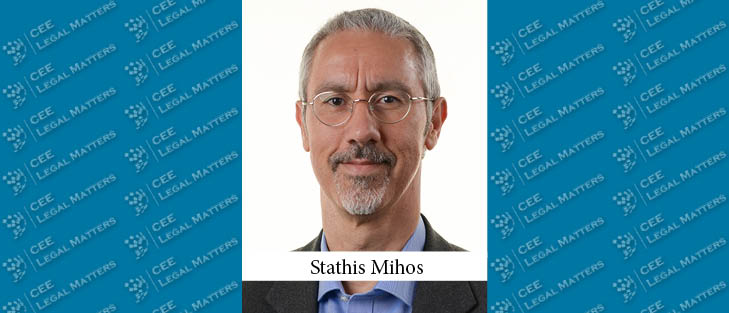As Pfizer’s Legal Director overseeing Greece, Cyprus, Malta, and Israel, Stathis Mihos explores EU health policy advancements and the complexities arising from the pandemic and examines how artificial intelligence is dynamically influencing lawyers’ work.
CEELM: Tell us a bit about yourself and the career path you took leading up to your current role.
Mihos: I studied law at the University of Athens and later obtained my postgraduate degree (LL.M.) in Information Technology and Telecommunications Law from the University of Strathclyde, Glasgow. Additionally, I hold an M.A. degree in Tourism Business Administration from the Hellenic Open University.
After graduating, I initially worked as a lawyer in various law firms. In 2001, I began managing in-house legal departments for the Greek affiliates of international companies, including Lafarge, BP, Carrefour, and since 2013, Pfizer. I joined Pfizer as Legal Director about eleven years ago and I’m now responsible for managing the company’s legal affairs in Greece, Cyprus, Malta, and Israel.
I am also the author of many articles and books, including Monitoring of Internet Communications in the Workplace (Sakkoulas Publications, 2007), In-house Counsel (Nomiki Vivliothiki Publications, 2013), and contributor to The Future of the In-house Lawyer: The General Counsel Revolution (The Law Society of England and Wales, 2016).
CEELM: Over the past years, what has been your main focus?
Mihos: The pandemic period was of course difficult for all people and all businesses. Fellow lawyers of all companies had to deal with a number of novel legal issues in the ways of working, distributing products, managing payments, concluding agreements, ensuring the health of employees, and at the same time safeguarding personal data, to name but a few. Obviously, in our company, we dealt with all of this, but at the same time, we needed to run at high speeds to support the effort to develop a vaccine against the virus. At the level of the four national markets that I support, this meant working with the relevant departments to conduct trade negotiations, manage potential claims, confirm compliance with pharmaceutical legislation, etc. under largely unclear and constantly changing conditions. This job involved many hours of continuous work and several late nights, many stresses and anxieties, many meetings, video conferences, phone calls, and countless emails. But for the first time in my professional life, I felt such feelings of joy and pride seeing that my effort added up to the huge effort of thousands of Pfizer employees and partners to overcome the problem and save millions of lives.
CEELM: How have your focus and priorities shifted post-COVID-19?
Mihos: The pandemic has imposed structural changes in health, which will have a long-term character and will shape the future. The speed with which science has moved, with the discovery of a vaccine and a treatment in a very short time, opens new horizons for new innovations that will contribute to improving patients’ lives. New digital technologies (artificial intelligence, machine learning, etc.) and developments in data science will also play a decisive role, which will radically change the management of serious diseases and put the patient at the center.
Additionally, the pandemic and the wider changes that have taken place in Europe have highlighted the need to revise the EU health strategy so that all countries can respond to every next challenge. The aim of the new global strategy is equal access for all citizens to innovative medicines and treatments. For example, with the Pact for a Healthier World, Pfizer provides all patented high-quality medicines and vaccines available in the U.S. or European Union to 1.2 billion people in 45 lower-income countries without profit. In this way, the pact aims to significantly reduce existing health inequalities between many lower-income countries and the rest of the world.
CEELM: Looking ahead, what do you anticipate keeping you busy in the next period?
Mihos: The EU initiative on the European Health Data Space (EHDS) is very important and goes in the right direction to ensure that all citizens can have the best healthcare across the EU. At the same time, the EHDS promotes innovation as data will be used in research to develop new treatments that will cover unmet medical needs (secondary use of electronic health data), after ensuring the transparency of the system with mechanisms that will fully protect citizens’ personal data. This initiative is also in line with the digital transformation strategy in healthcare that has already begun and will further enhance citizens’ accessibility to health services and the quality of the health system.
CEELM: What is the one piece of advice you would give to improve organization within an in-house legal department?
Mihos: In business, we are all often called upon to do “more with less.” While this may be feasible in some cases, it is clearly not an ideal or viable way to legally do business. So, we end up just doing “less with less” – and that’s not a bad thing if done the right way. In order to be productive, while protecting our health and well-being – which is important not only for us but also for our employer, we must be selective in where it is best to offer our services. Consequently, we now provide “Principled Advice” (or PBA – Principle Based Advice). This means implementing strategies to help our internal clients help themselves, thereby fostering a culture of compliance and multiplying the beneficial influence of the legal team across the organization. Succeeding requires a change of mentality: both from clients, who must learn to apply the principles of a sound legal solution without being told specifically how, and from lawyers, who must limit their involvement in a range of activities without ceasing to be friendly and supportive. I’m sure a lot of legal services are already implementing PBA – I guess we just gave it a nice name and, maybe, took it to the next level.
CEELM: Looking ahead, what do you anticipate will be the main challenges for GCs in Greece in the upcoming future?
Mihos: Currently, there’s a lot of controversy around artificial intelligence. I have the honor of being on the Standing Scientific Committee of the Greek Ministry of Justice for Artificial Intelligence in the Judicial System, co-representing the Athens Bar Association. I also co-represent Greek lawyers in the Future and IT Committees of the Council of Bars and Law Societies of Europe. Finally, I’m a member of the Pfizer Working Group on Ethical and Responsible Artificial Intelligence.
I mention these to explain that I have good opportunities to follow technological developments and I appreciate the efforts to regulate the use of AI technology in such a way that efficiency is combined with the protection of human rights, in a broad sense. However, I will quote Richard Susskind, who paraphrased Isaac Asimov and said: “In the short term, people overestimate what AI will achieve, but in the long run they underestimate it.” This applies to all uses in general, but also to AI use in the area of justice in particular. Indeed, legal tech is currently developing significantly with many mainly small companies trying to innovate in the field, but without yet seeing a boom that would overturn what we know. There are, of course, significant improvements, in particular, but not exclusively, in the legal review of texts, while particular emphasis seems to have been placed on the effort for remote administration of justice. Europe is rather sluggish in the relative race of AI in justice and Greece, despite the efforts made, still has a long way to go. But the younger generations have received the message and are preparing and that is promising.
This article was originally published in Issue 11.7 of the CEE Legal Matters Magazine. If you would like to receive a hard copy of the magazine, you can subscribe here.





















